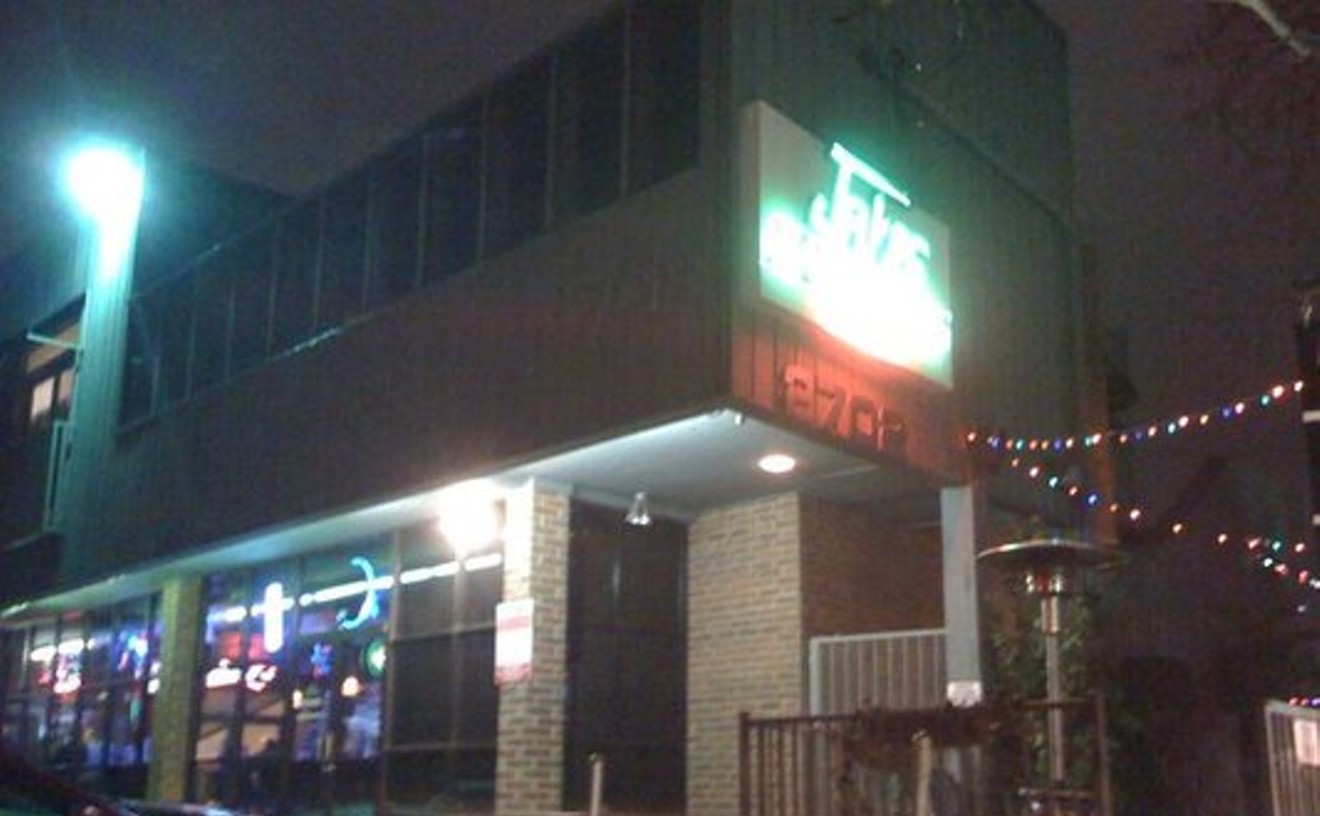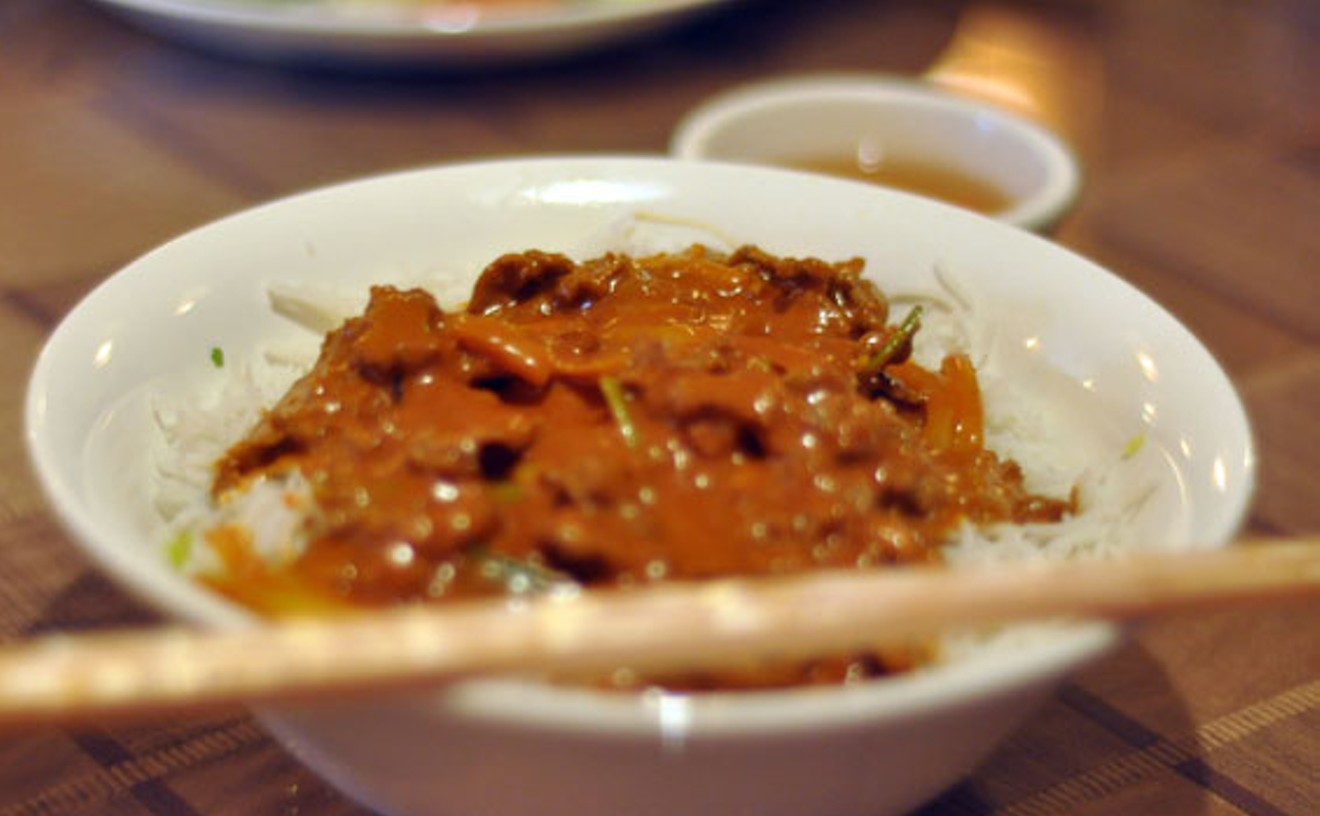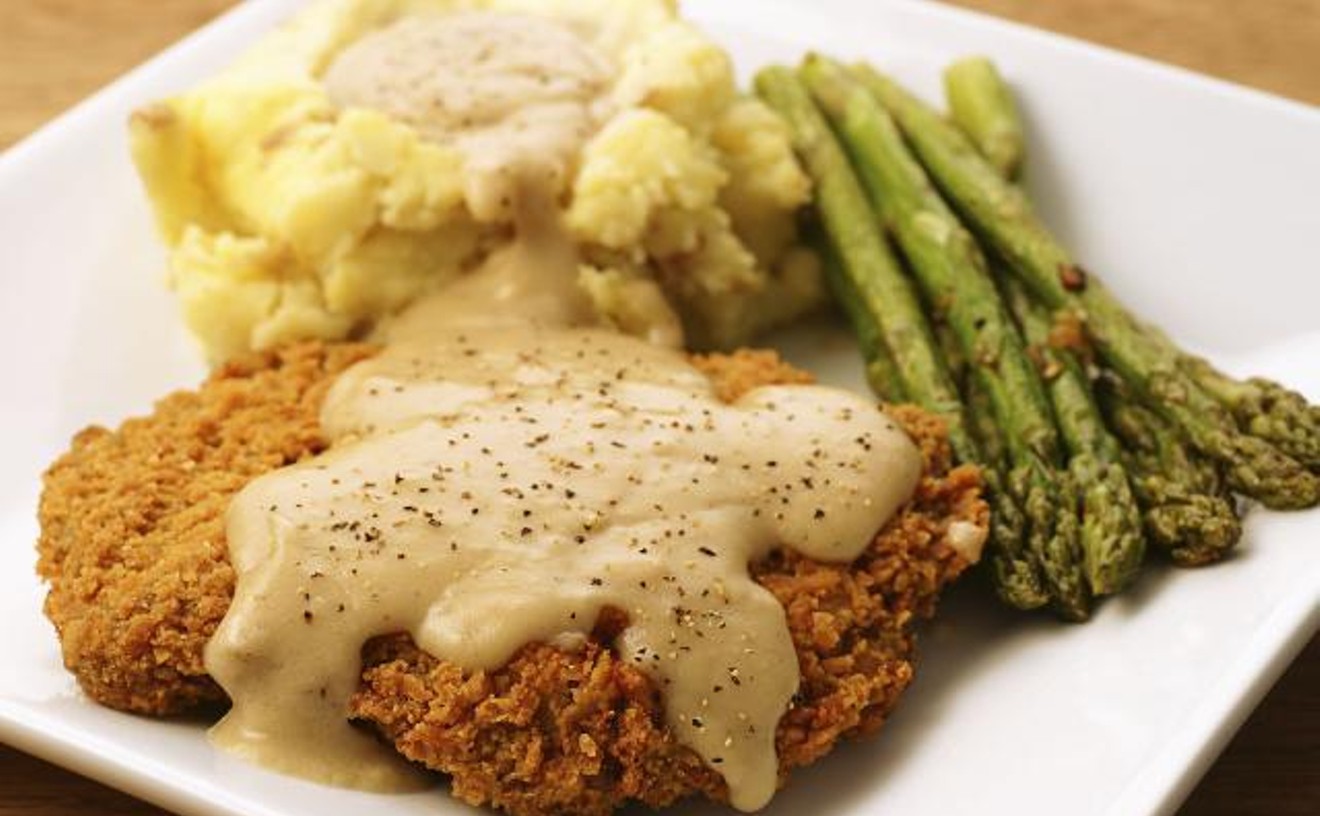This locally owned nook in the shops of South Side on Lamar seems an unlikely place for a campaign hub or monument to black political history. Yet the bright orange walls are covered with framed paintings of Martin Luther King Jr. and Malcolm X as well as local art that portrays black history. Owner Jan Gore, who was born and raised in Dallas and once worked for Ann Richards, was a passionate Barack Obama supporter during last spring's primary and turned the place into an unofficial campaign headquarters. No matter your political leanings, though, you'll enjoy the inexpensive food in a bright, casual atmosphere. There's a quarter jerk chicken served with salad and side for $8.50, spicy grilled shrimp for less than $7 and smoked jerk turkey legs for $5.50. You can even order whole jerk turkeys and chickens to go, and we can't forget the hallmark of any Caribbean place: the delicious baked plantains.
Best Unlikely Campaign Hub
Texas Caribbean Foods
Best Unusual Side Dish
Houston's Restaurant

A staple in Israel and North Africa, couscous has long been a side dish at Middle Eastern restaurants, but now it's making its way onto menus at places like Houston's. The weird thing is, Houston's does it as well as anyone (like a lot of things the restaurant does). With sliced radishes, golden raisins, almonds, tomatoes, green onions and parsley, it's a perfect side dish to a plate of chicken.
- 5318 Belt Line Rd., Dallas, 75240 Map
- 972-960-1752
- www.houstons.com
Best Use of a Tuber
Jake's Hamburgers

The decision to upgrade to sweet-potato fries with your next meal at Jake's Hamburgers is not one to be taken lightly. Not so much because they cost a buck or so more than french fries, but because plain old french fries will never hold quite the same appeal after you've experienced Jake's sweet potato fries. Dusted with a mixture of sugar, salt and cinnamon, they're a wonderful balance of sweet and salty, crispy and soft. They hold up whether you dip them in ketchup, Tabasco, ranch or your chocolate malt, or even if you eat them dry. Sure, Burger House's seasoned fries and Steak 'n' Shake's crispy thin slivers make a case for the traditional french fry. But there's no going back after grabbing a handful of yam at Jake's.
- 2702 McKinney Ave., Dallas, 75204 Map
- 214-754-8001
- www.jakesburgers.net
Best Vegan Adventure
New Start Veggie Garden

We love seitan. We also love tempeh, tofu and textured vegetable protein. But occasionally, we do feel the need to break out of the stir-fry and pasta dish routine. So we head to New Start Veggie Garden, which offers an all-vegan buffet that's a mix of veggie favorites (fried rice, tofu lasagna) and offbeat Asian food. The lunch buffet begins with "mountain-grown mushroom" tea, and then it's on to miso, veggie sushi, broccoli tempura and two kinds of veggie burgers. The more adventurous will want to try the wild fern, sesame greens and a bibimbap bowl topped with seasoned seaweed and kelp powder (and washed down with sweet rice drink). For dessert, expect fruits, tofu cheesecake or cookies with flaxseeds. And as far as adventures go, this is a pretty inexpensive one—two can eat for less than $20.
- 2330 Royal Lane, Dallas, 75229 Map
- 972-243-0507
- www.newstartveggiegarden.com
Best Vegetarian Restaurant
Spiral Diner

Longtime vegetarians are resigned to the fact that, when dining out, they usually have one or two choices on the menu. Lack of excitement washes over you as the server brings your steakhouse selection: a plate of iceberg lettuce with carrot shreds and a cherry tomato. So when you are presented with the abundance of choices at Spiral Diner—everything on the menu is vegan—prepare to feel a little overwhelmed. Sure, they have salads, if that's what you're into, but they also have delicious wraps (the Parmigiana is warm and delicious), sandwiches, burgers, and pasta and other hot plates. Try "The Mitch," a savory tofu club sandwich, or for a heartier entrée, there's Viva Las Migas or Sketti & (Soy) Meatballs. Organic juices and coconut limeade are a delight. Desserts are plentiful, including "I-scream," cupcakes, cookies and brownies on our last visit. Blue Sky natural sodas are on tap, and you can indulge in some reading material while you wait—The Sexual Politics of Meat, anyone?
- 1101 N. Beckley Ave., Dallas, 75203 Map
- 214-948-4747
- www.spiraldiner.com
Best Vietnamese Restaurant
Mai's Vietnamese Restaurant

How do we love Mai's? Let us count the burn scars on the roofs of our mouths from all the times we couldn't wait to dig into our chicken clay pot because it smelled too damn yummy. Yeah, we're stupid that way, especially when it comes to Mai's fiery baked blend of vermicelli noodles, black mushrooms and spicy chicken, which comes out of the kitchen at approximately 875 degrees. We just can't wait. Luckily the burns heal in a couple of weeks, and in the meantime we can take a break from the pain by making a meal on two or 20 of the shrimp imperial rolls, fat tubes of soothing crunchy lettuce, rice noodles and chilled shrimp in rice paper wrappers. A little agony, a little comfort, a lot of spicy deliciousness—a meal at Mai's is like love.
- 4812 Bryan St. #100, Dallas, 75204 Map
- 214-826-9887
- mairestaurant.atspace.com
Best Waitstaff
Lucky's Café

So, we've been on this diet since—oh, what's it been now?—1973, seems like. That means nothing but veggies, and hold the bread. It also means we're very, very cranky at mealtime. The kindly staff at Lucky's understands. They gently wave us to our table and fetch a giant Diet Coke before we've even unrolled our napkin. "Still dieting?" they ask sympathetically with a smile as they take our usual order of nothing but veggies, bringing us the one cheating biscuit we request and promising not to bring another one even if we beg. Truth be told, we think they would give us another if we begged, but lucky for us, the service at Lucky's is so kind, welcoming and friendly that one is enough to take the edge off our 'tude. Someday soon, the diet from hell will end, and we'll surprise them by ordering that gooey cheeseburger and fries we crave. When we do, they won't judge. Shoot, they may applaud.
- 3531 Oak Lawn Ave., Dallas, 75219 Map
- 214-522-3500
- www.luckysdallas.com
Best Way the Cookie Crumbles
Hot Chocolate Chip Cookie

Prepare for battle. Kathleen's Sky Diner (formerly Kathleen's Art Café) is known for fantastic cakes. Chances are, your dining companion knows this—or can tell from the dessert display—and will challenge your suggestion of the hot chocolate chip cookie. Do not back down. Order the cookie and wait. Be patient though: Each cookie is baked to order. When it arrives, the hot steamy dish of oatmeal, pecans, chocolate chips and a scoop of vanilla ice cream will convert any naysayer. Go ahead and share—for the sake of your hips and ass—but be certain there will be one final duel. You may have played fair for the most part, but that cobbler-like concoction will have taken on melty ice cream and seduced you with rich, absolutely decadent mouthfuls. And when it comes to that last bite, both parties will fight, forks brandished, to claim the final delectable morsel.
- 4424 Lovers Lane, Dallas, 75225 Map
- 214-691-2355
- www.kathleensartcafe.com
Best Wine List
Charlie Palmer
It's a new age, when cell phones navigate and home theater experiences can be had on media players barely larger than credit cards. Enter the touch-screen tablet wine list. Charlie Palmer's wine list is an ingenious harnessing of technology to help newbie drinkers overcome their fear of coming off as a vino-imbecile. The Charlie Palmer wine selection experience is self-directed via an electronic touch-screen e-book that permits perusal by bottle, glass, region, varietal and style. Check the boxes next to your curiosities and wrestle over the pros and cons of each with a sommelier, suited-up for upscale battle. Added bonus: Charlie Palmer sells its 700-plus bottle list at markups of just $25-$35 over retail, so you won't get corkscrewed. Added double-plus bonus: The restaurant is fronted by the Next Vintage Wine Shop stocking a third of the wine list, ready to tag and bag for home.
Driving across his ranch in Greenville,Robert Hutchins watches as a hawk swoops down into one of his chicken hoops (no, not coops). Killing the engine of his flat-bed truck, Hutchins waits for the hawk to come back into sight. "I just saw you," he says under his breath. "Look at that dadgum hawk, bet it just killed a chicken."
But Hutchins isn't upset and gnashing his teeth, because at Rehoboth Ranch losing a few chickens to predators like bobcats and hawks is an unavoidable part of the way they do business.
Bucking the trends of conventional agriculture—instead of using confinement houses, cramped cages or feedlots—all the animals on Hutchins' ranch are "pasture-raised" in their natural environment and fed only a natural diet. And the Hutchins family manages the 300 acres of their ranch organically, never using any chemicals, pesticides or synthetic fertilizers. While Hutchins' methods are firmly rooted in the past and may seem counterintuitive in today's work-smarter-not-harder world, farmers and ranchers like him are looking to the past while paving the way for the future of food.
This year the Food and Drug Administration made several controversial rulings, including declaring milk and meat from cloned cattle, goats and swine as safe as conventional meat and issuing new regulations approving the irradiation of fresh spinach and iceberg lettuce. But as more and more genetically modified foods are introduced to the public, and meat and produce recalls continue to be a staple on the evening newscasts, many shoppers alarmed by the practices of modern agriculture are turning to naturally raised, organic products.
So, the future of food is at a crossroads that leads in two utterly different directions. Down one path, our grocery stores' shelves will be filled with genetically modified foods, cloned meats, and irradiated grains and produce. On the other path, wary shoppers will increasingly seek out natural foods produced by farmers and ranchers like Hutchins and his family, who use the traditional methods of the past.
"The only way the consumers can be 100 percent sure what they're eating is to know where it comes from, know the people who raise it and know how they raise it," Hutchins says. "And we don't sell any product where we aren't there handing it over to the customer."
The Hutchins family does all the work on the ranch, from milking the goats and gathering eggs to processing the chickens. Visitors to Rehoboth can purchase the meats, dairy products and eggs in the ranch's store, but the majority of business is done at farmers markets in Dallas, McKinneyand Coppell. The family initially thought that their business could be supported by consumers driving out to their farm, but they soon realized that they needed to get closer to them. And the strategy worked. Hutchins says, "I can plot the weekly sales from all the farmers markets, since the beginning, and the growth is very consistent.
"People are starting to rightfully deduce that there is a definite connection between the foods we eat and our overall health," he says. By eating grass-fed meats, he says, consumers can avoid the antibiotics, growth hormones and other questionable additives found in conventionally raised animals. "Someday I think we'll look back on this period of history and say that we were very ignorant and barbaric about the things we offered to the general public to eat."
Hutchins says whether one believes that animals evolved or were intelligently designed, modern agricultural trends are a problem because either way we're using technology to tamper with the natural order of things.
"We're not opposed to technology," he says. At Rehoboth they use computers extensively, modern electric fencing, and e-mail newsletters to keep in touch with their customers. "We're just for the appropriate application of technology."
One of the biggest problems that farmers like Hutchins faces is that a lot of historical knowledge has been lost over the years. They have to rediscover successful farming methods from the past. "Things that we're trying to do without chemicals people used to know how to do," he says. But over the years agriculture grew dependent on modern innovations. "We have to pick up things along the way. One person told us, 'I remember hearing that you can worm pigs with wood ashes.' And by golly, sure enough you can!"
They use electric fences to enforce rotational grazing. All the grazing area on the 300 acres is divided up into small paddocks. The animals are allowed to graze in one paddock only for a few days before they are moved to the next area, which allows the freshly grazed and recently fertilized grass to rest before it is grazed again.
Hutchins wasn't born into farming. "You'd have to go back to my great-grandfather to find someone in my family who made their living in agriculture," he says. After spending more than 20 years in the defense industry, he decided to leave the corporate world behind. But the first few years on the ranch weren't easy.
"Becoming financially viable was a lot slower process than I would have thought," he says. "And it took a lot more of my savings than I'd imagined. But it is worth it to be working with my family and not have to live the stressful corporate existence."
Each year Hutchins sees more people who are interested in Rehoboth's products. "I think this trend will continue to grow until it significantly damages the established mainstream food infrastructure," he says. "This year, for the first time, we have competitors at the farmers markets. But the whole market grows like a rising tide. The demand and the supply grow at a reasonably balanced rate."
And when asked about the long-term prospects for his business and those like him, he says, "So long as the mainstream food supply remains corrupt, our outlook looks bright. And the government hasn't disappointed me yet." Daniel Rodrigue






